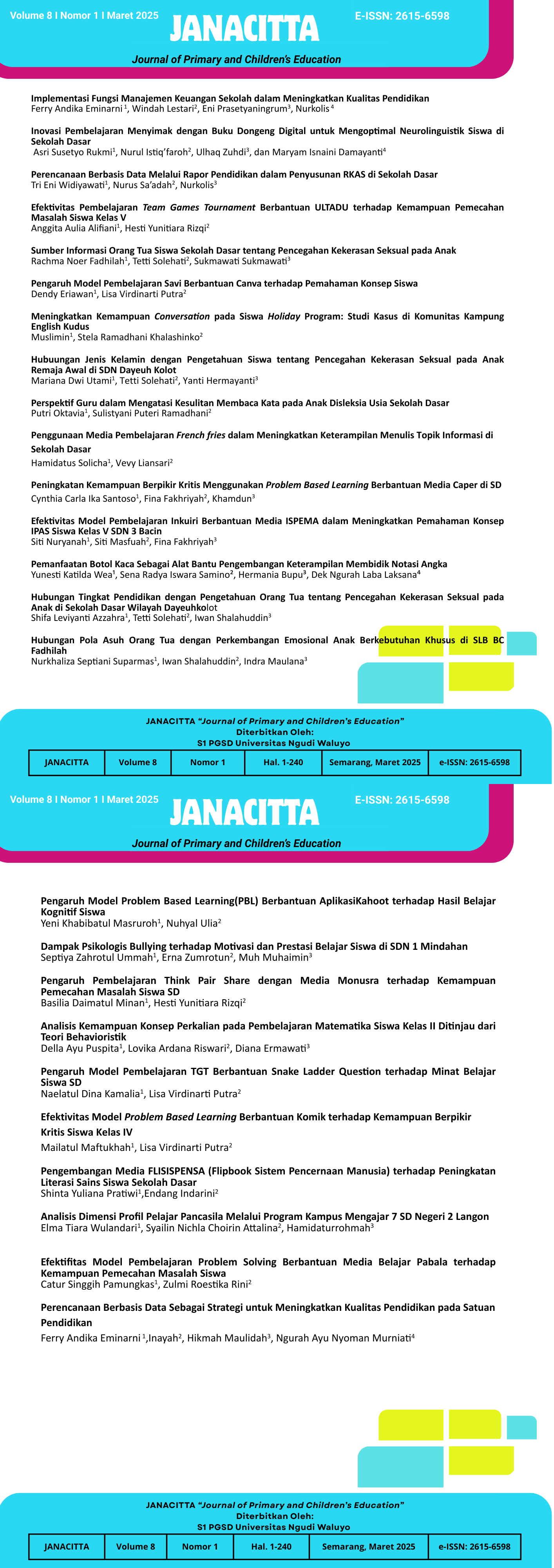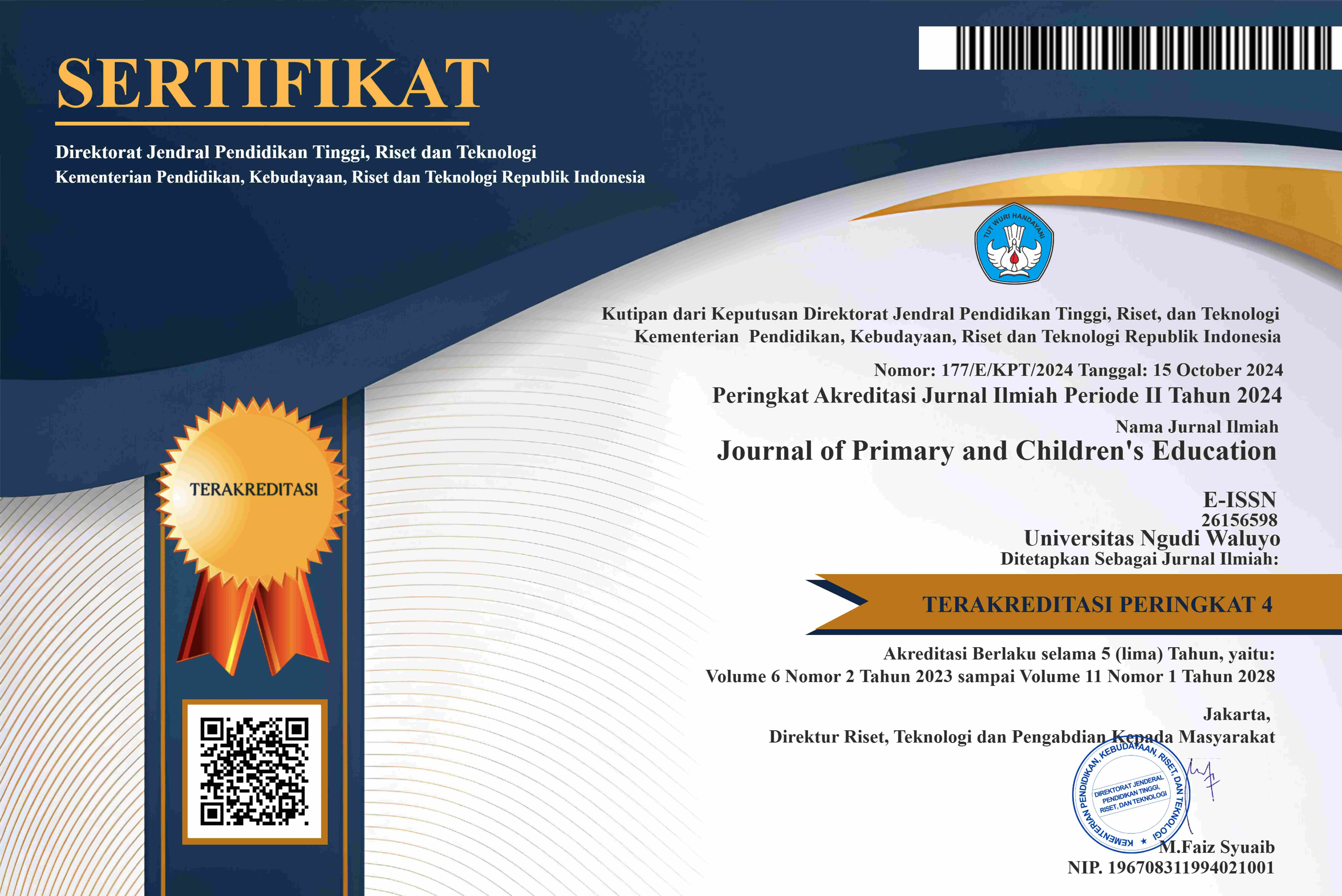Pengaruh Model Problem Based Learning (PBL) berbantuan Aplikasi Kahoot terhadap Hasil Belajar Kognitif Siswa
DOI:
https://doi.org/10.35473/janacitta.v8i1.3792Abstract
Abstract
The aim of the research is to determine the effect of the Problem Based Learning (PBL) model assisted by the kahoot apllication on students` cognitive learning outcomes. The research method used is a quantitative approach with a pre-experemental design and using a one group pretest-posttest model. The populayion in this study were fifth grade student at SD Negeri Adikarto 1 who were selected using a saturated using a saturated sampling technque. The instrument used is a description test that has beeb validated. The result of this research show an increase in student learning outcomes, with an average pretest score of 51.92 increasing to 80.38 in the posttest score. The paired sample-t test statistical test shows a significance value of 0.000 < 0.05 which proves that there is a significant influence from the application of the Problem Based Learning (PBL) model assisted by the kahoot application on student’s cognitive learning outcomes.
Abstrak
Tujuan penelitian adalah untuk mengetahui pengaruh model Problem Based Learning (PBL) berbantuan aplikasi kahoot terhadap hasil belajar kognitif siswa. Metode penelitian yang digunakan adalah pendekatan kuantitatif dengan desain pre-eksperimen dan menggunakan model one group pretest-postest. Populasi dalam penelitian ini adalah siswa kelas V SD Negeri Adikarto 1 yang dipilih melalui teknik sampel jenuh. Instrumen yang digunakan adalah tes uraian yang telah divalidasi. Hasil penelitian ini menunjukkan adanya peningkatan hasil belajar siswa, dengan rata-rata nilai pretest 51.92 meningkat menjadi 80,38 pada nilai postest. Uji statistik Paired Sample t-tes menunjukkan nilai signifikansi sebesar 0.000 < 0.05 yang membuktikan adanya pengaruh signifikan dari penerapan model Problem Based Learning (PBL) berbantuan aplikasi kahoot terhadap hasil belajar kognitif siswa.
References
Agustyaningrum, N., Pradanti, P., & Yuliana. (2022). Teori Perkembangan Piaget dan Vygotsky: Bagaimana Implikasinya dalam Pembelajaran Matematika Sekolah Dasar?. Jurnal Absis: Jurnal Pendidikan Matematika dan Matematika, 5(1), 568–582. https://doi.org/10.30606/absis.v5i1.1440
Auliya F.A,Fitriasari E, Nurunnisa. N, M. . (2023). Pengaruh Penggunaan Media Pembelajaran Interaktif terhadap Hasil Belajar Siswa di Sekolah Dasar. Jurnal Pendidikan Dasar dan Sosial Humaniora, 2(8), 953–968.
Dakhi, A. S. (2020). Peningkatan Hasil Belajar Siswa melalui Metode PAKEM. Jurnal Pendidikan Indonesia, 1(3), 350–361. https://doi.org/10.36418/japendi.v1i3.33
Kristinawati, E., Susilo, H., & Gofur, A. (2018). ICT Based-Problem Based Learning on Students’ Cognitive Learning Outcomes. Jurnal Pendidikan Sains, Vol. 6(2), 38–42. http://journal.um.ac.id/index.php/jps/
Putri, H., Susiani, D., Wandani, N. S., & Putri, F. A. (2022). Instrumen Penilaian Hasil Pembelajaran Kognitif pada Tes Uraian dan Tes Objektif. Jurnal Papeda: Jurnal Publikasi Pendidikan Dasar, 4(2), 139–148. https://doi.org/10.36232/jurnalpendidikanda sar.v4i2.2649
Safitri, E., Wawan, Setiawan, A., & Darmayanti, R. (2023). Eksperimentasi Model Pembelajaran Problem Based Learning berbantuan Kahoot terhadap Kepercayaan Diri dan Prestasi Belajar. Jurnal Penelitian Tindakan Kelas, 1(2), 57–61. https://doi.org/10.61650/jptk.v1i2.154
Sakdah, M. S., Prastowo, A., & Anas, N. (2021). Implementasi Kahoot Sebagai Media Pembelajaran Berbasis Game Based Learning terhadap Hasil Belajar dalam Menghadapi Era Revolusi Industri 4.0. Edukatif: Jurnal Ilmu Pendidikan, 4(1), 487–497. https://doi.org/10.31004/edukatif.v4i1.1845
Setiyaningrum, M. (2018). Peningkatan Hasil Belajar Menggunakan Model Problem Based Learning (PBL) pada Siswa Kelas 5 SD. Jartika: Jurnal Riset Teknologi dan Inovasi Pendidikan, 1(2), 99–108.
Downloads
Published
How to Cite
Issue
Section
License
Copyright notice:
- Authors retain copyright and grant the journal right of first publication with the work simultaneously licensed under Creative Commons Attribution License that allows others to share the work with an acknowledgement of the work's authorship and initial publication in this journal.
- Authors are able to enter into separate, additional contractual arrangements for the non-exclusive distribution of the journal's published version of the work (e.g., post it to an institutional repository or publish it in a book), with an acknowledgement of its initial publication in this journal.
- Authors are permitted and encouraged to post their work online (e.g., in institutional repositories or on their website) prior to and during the submission process, as it can lead to productive exchanges, as well as earlier and greater citation of published work (The Effect of Open Access)







